Key takeaways:
- Experiential learning emphasizes the power of hands-on experiences, fostering resilience and personal growth through real-world challenges.
- Systematic reflection transforms experiences into meaningful knowledge, revealing insights and emotional connections that enhance future performance.
- Effective reflection techniques include mindfulness, sharing with trusted individuals, and visualizing experiences to clarify thoughts and emotions.
- Continual improvement relies on the iterative nature of reflection, enabling individuals to adapt their approaches and embrace constructive feedback for growth.
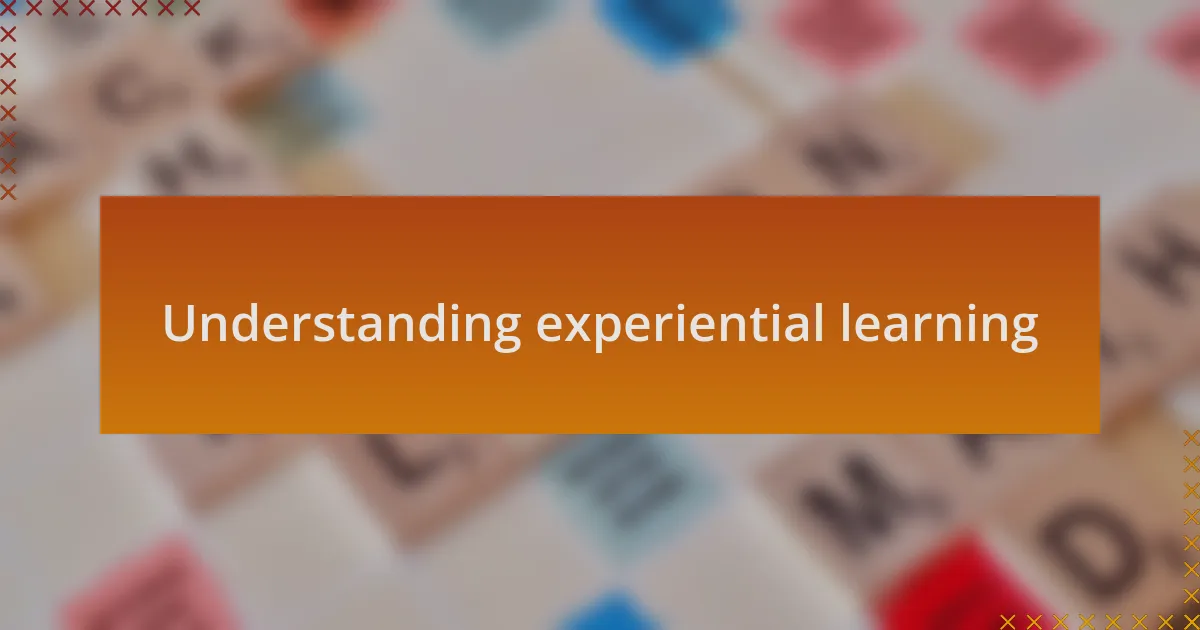
Understanding experiential learning
Experiential learning is all about learning through experience, rather than just passively absorbing information. I remember when I first encountered this concept during a workshop; it felt transformative. Engaging in hands-on activities allowed me not only to grasp theoretical concepts but also to apply them in real-world scenarios.
What is it about experiencing something firsthand that makes it so powerful? From my perspective, it’s that visceral connection to the material. For example, participating in a local community project opened my eyes to the complexities of teamwork and problem-solving. Each challenge we faced together taught me lessons that no textbook could convey.
I often reflect on how experiential learning nurtures resilience. There were moments when things didn’t go as planned, yet those setbacks became invaluable teaching moments. I felt empowered to adapt and overcome, which deepened my overall understanding of the process. I believe this is what makes experiential learning not just an educational technique, but a profound journey of personal growth.
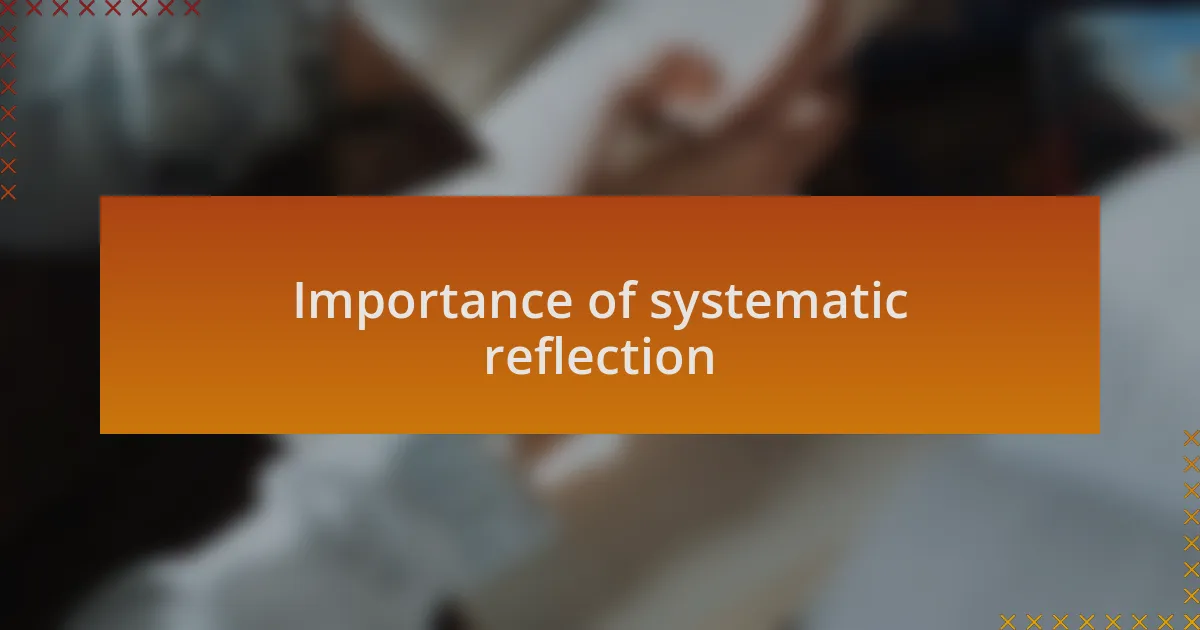
Importance of systematic reflection
Systematic reflection is crucial for synthesizing experiences into meaningful knowledge. I often think about a particular project I led, where I took time after each phase to reflect on what worked and what didn’t. This practice not only strengthened my problem-solving skills but also helped me avoid repeating mistakes in subsequent projects.
Why is it that some experiences linger in our minds while others fade away? In my experience, systematic reflection allows us to capture those fleeting insights. After a particularly challenging event, I dedicated a few moments to jot down my thoughts. It was amazing how those reflections turned into guiding principles for my future work, showing me the value of intentional contemplation.
Moreover, engaging in systematic reflection fosters a deeper connection to our learning. I’ve found that revisiting my experiences often awakens emotions I’d overlooked. One time, after reflecting on a presentation that went poorly, I uncovered a fear of public speaking that had been quietly holding me back. By addressing that fear head-on through reflection, I not only improved my skills but also gained confidence in my voice.
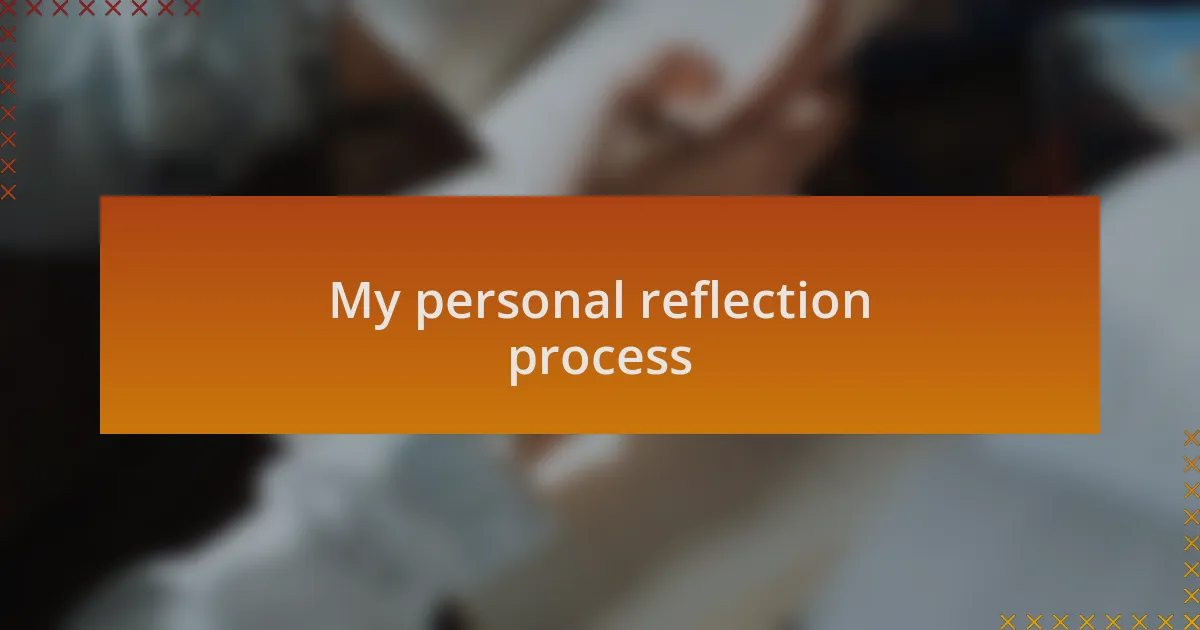
My personal reflection process
When it comes to my personal reflection process, I often find myself drawing from moments that unexpectedly shape my understanding. For instance, after a volunteer experience where I struggled to connect with the team, I took a quiet evening to sit with my thoughts. It was during that time that I realized how vital collaboration is to me and how communication barriers can stifle even the most enthusiastic efforts.
I also keep a journal dedicated solely to my reflections. This practice has become a lifeline during challenging times. One entry, in particular, resonated deeply; I wrote about a failure that seemed insurmountable at the moment. Looking back, I remember how cathartic it felt to untangle my feelings and observe the lessons that emerged from that disappointment. Isn’t it fascinating how discomfort can drive growth if we let it?
In recent months, I’ve begun to use guided reflection prompts, allowing me to dive deeper into my experiences. Questions like “What did I learn about myself?” or “How can I apply this in the future?” have opened doors to insights I might have otherwise overlooked. After reflecting on a failed project, I discovered my tendency to overplan. That realization was eye-opening and has changed how I approach organizing tasks. Engaging with these questions not only enriches my learning but also sparks a sense of curiosity about my evolving journey.
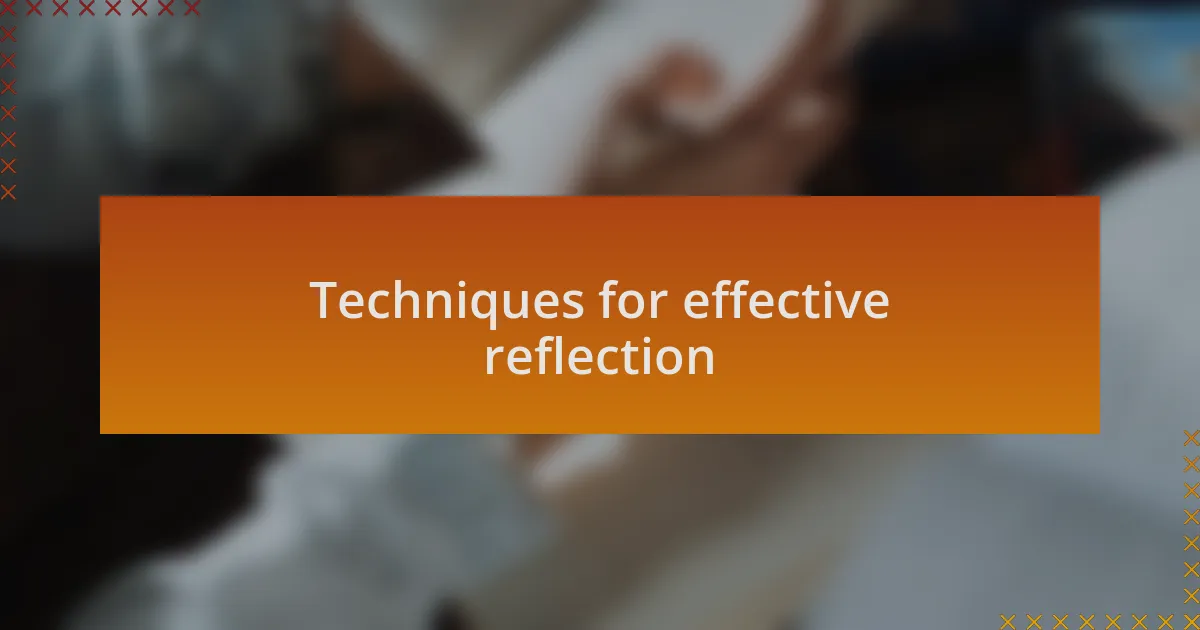
Techniques for effective reflection
One technique that has proven effective for me is the practice of mindfulness during reflection. I often set aside a few minutes to meditate before jotting down my thoughts. This quiet time helps me clear my mind, allowing me to approach my experiences with a fresh perspective. Have you ever noticed how much easier it is to uncover insights when you take a moment to breathe and center yourself?
Additionally, I find that discussing my reflections with a trusted friend can lead to unexpected revelations. During a recent conversation about a challenging project, my friend offered a perspective I hadn’t considered, which shifted how I viewed my involvement. By sharing our reflections, we open ourselves up to new interpretations and a deeper understanding of our experiences. Isn’t it amazing how collaboration extends beyond just teamwork to include the act of reflecting?
Another powerful technique I’ve adopted is creating visual maps or diagrams to represent my thoughts. After experiencing a particularly overwhelming week, I sketched out my feelings and the root causes. This visual approach helped clarify my emotions and highlighted patterns I hadn’t noticed. Have you ever tried mapping out your reflections in a creative way? Sometimes, seeing the bigger picture in a different format can transform your understanding entirely.
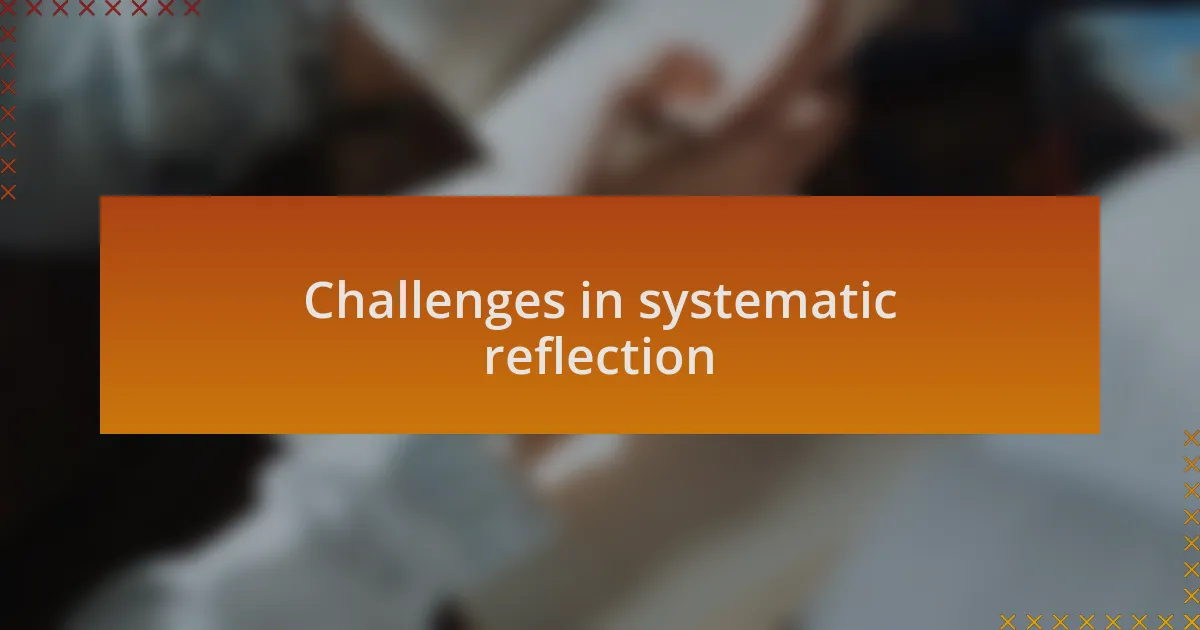
Challenges in systematic reflection
Systematic reflection can often feel like an uphill battle. One significant challenge I encounter is allocating enough time amidst a busy schedule. I remember a period when I was juggling multiple projects, and the idea of stopping to reflect felt like a luxury I couldn’t afford. Have you experienced a similar struggle? It’s tough when the demands of the day overshadow the necessity of self-assessment.
Another hurdle is the potential emotional discomfort that comes with unfiltered reflection. There have been moments when I faced uncomfortable truths about my choices or behaviors. I recall after an ineffective presentation where I had to confront my own shortcomings. Instead of shying away, I decided to dive into those feelings, allowing them to guide me towards improvement. This process is undeniably challenging, but it often leads to profound growth. How often do we truly confront our fears and learn from them?
Lastly, I’ve found that a lack of structure in the reflection process can leave me feeling lost. One time, I attempted free-writing my thoughts without any guiding questions or framework, and the result was a tangled mess of ideas. It made me realize that having a clear framework—be it prompts or specific objectives—can anchor the reflection process. Do you have a system that helps streamline your reflections? Embracing a structured approach can make navigating those depths of experience much more manageable.
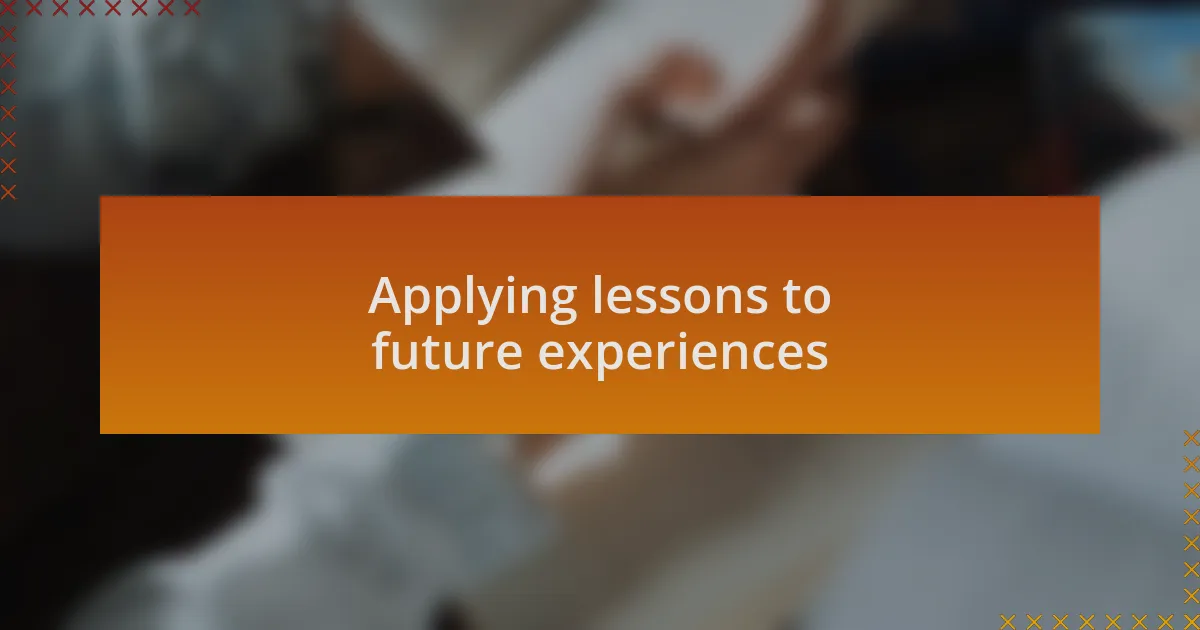
Applying lessons to future experiences
Reflecting on past experiences isn’t just about analyzing what went wrong; it’s also about discovering what worked well and how I can replicate those successes. For instance, after a workshop where I received positive feedback for my engaging facilitation style, I noted the techniques I used. Now, whenever I prepare for a similar setting, I consciously apply those insights, reminding myself of the impact they had on participants. Have you ever had a moment when a small shift in your approach made a big difference?
Drawing lessons from my reflections often feels like constructing a roadmap for future endeavors. I vividly remember revisiting my approach to teamwork after a project didn’t meet its objectives. I took a step back, reflecting on the dynamics within the team, and realized I had been too hands-off. By expressing my insights in follow-up meetings, I’ve since adapted my engagement style, leading to greater synergy. Have you considered how tweaking just one aspect of your approach could lead to a different outcome next time?
Moreover, I find it essential to create an emotional anchor from these reflections. There was a time when I felt disheartened after receiving critical feedback. Instead of dwelling on the negativity, I chose to view it as an opportunity for growth. By transforming that feedback into a learning experience, I’ve learned to embrace constructive criticism. How can we turn our emotional responses into catalysts for growth in our future actions? Just think about it—every challenging moment is a stepping stone toward improving ourselves and our experiences.
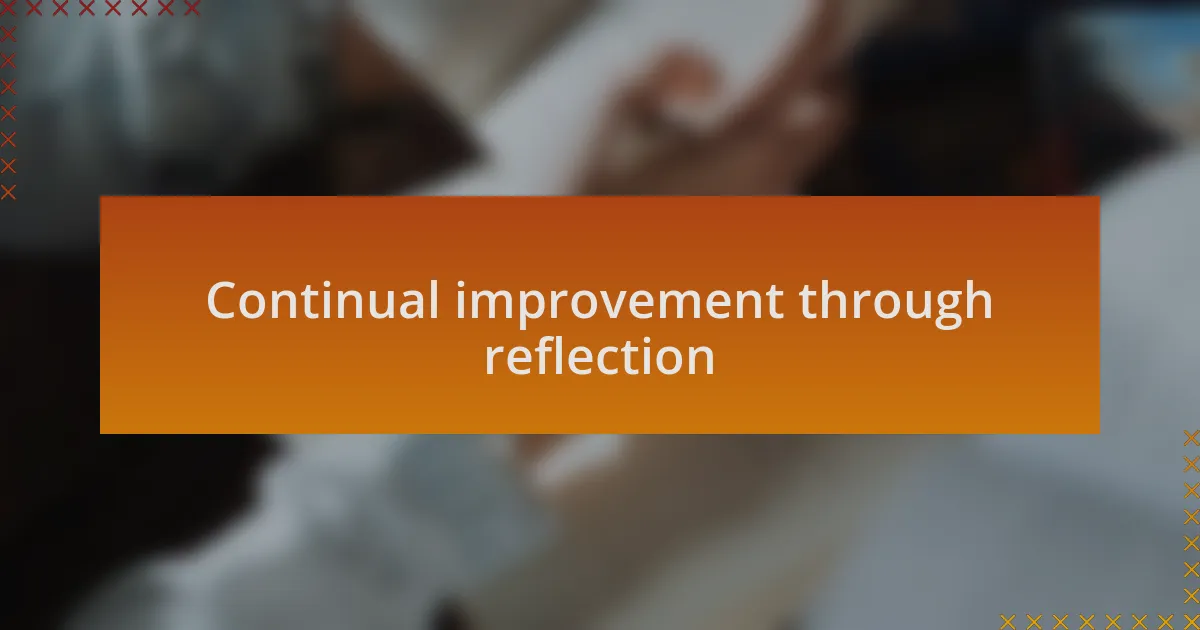
Continual improvement through reflection
Reflecting on my experiences has become a vital practice for continual improvement. I remember a time when I wasn’t particularly happy with the outcome of a presentation I gave. Afterward, I took a moment to assess not just my delivery, but also how I connected with the audience. This reflection helped me recognize that my nerves had overshadowed my ability to engage. By identifying this, I focused on techniques to manage anxiety, leading to a much stronger performance in my next presentation. Have you ever considered how self-awareness can enhance your effectiveness in similar situations?
The beauty of systematic reflection lies in its iterative nature. Recently, I embarked on a new mentorship program where I facilitated discussions between participants. Initially, I approached it like a lecture, but feedback revealed the space felt more one-sided. By reflecting on this, I adapted my style to promote dialogue. The shift not only enhanced participation but also deepened the connections formed during these sessions. How often do we miss opportunities for richer interactions because we’re stuck in old habits?
I find that journaling my reflections can significantly deepen the learning process. When I jot down my thoughts after an event, those notes often reveal patterns in my behavior that I may not have noticed in the moment. For example, after reflecting on my last team meeting, I recognized a tendency to dominate the conversation. This insight prompted me to make a conscious effort to listen more. Each reflection enhances my ability to adapt and refine my approach. Have you ever thought about how writing down your reflections could illuminate paths to improvement you hadn’t considered?